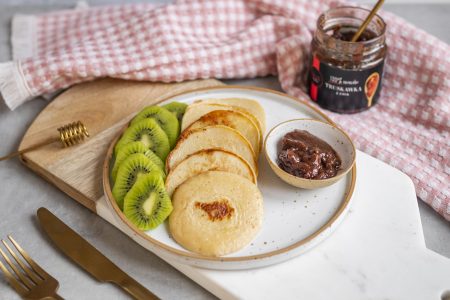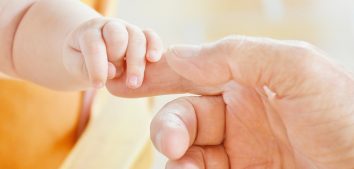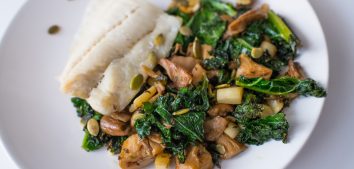
How Diet Affects Sleep Quality
Sleep, along with training and proper nutrition, are key components of a healthy lifestyle for me. I have already written a lot about how to take care of sleep. You can read about it, for example HERE. Today I will focus on how you can influence the quality of sleep with your diet. You will find out if there is a connection between what you eat and how you sleep. Interested? Let’s find out the answers together!
There is a growing body of scientific evidence suggesting that diet and sleep may be linked. I am going to describe some conclusions that may help you find the cause of your sleep problems or simply help you get better quality sleep. At the same time, don’t forget that sleep is influenced by many different factors. If you want to find out what they are, check out this post HERE.
Let’s start with what sleep actually is. According to the definition, sleep is a state of your nervous system when there is an abolition of consciousness and “stillness”occurs. Sleep repeats cyclically and passes during the day. Proper sleep is a reversible state, which means that under the influence of external factors, there is an awakening, i.e. a transition to wakefulness. Both coma and insomnia can be conditions leading to a number of complications. According to the US Centers for Disease Control and Prevention, sleep problems are associated with a higher risk of developing high blood pressure, compromised immunity, being overweight, obesity, decreased libido, depressed mood, depression and diabetes, stroke, cardiovascular disease, dementia, Alzheimer’s, and some cancers.
The analysis of many studies from recent years on the relationship between diet and sleep has helped to draw key conclusions:
- eating healthy food is associated with better sleep quality,
- eating processed and sugar-rich foods is associated with poorer sleep parameters,
- diets rich in fruits, vegetables and legumes have a beneficial effect on sleep,
- the benefits of increased consumption of vegetables, fruits, fish, water and fiber have been observed,
- diets high in carbohydrates, foods containing tryptophan, melatonin and phytonutrients (e.g. cherries) were associated with improved sleep scores,
- in very active people and athletes, an evening meal containing carbohydrates has a positive effect on falling asleep, especially after a late workout, and the consumption of dairy products can extend the duration of sleep,
- large portions and meals eaten late in the evening can negatively affect sleep,
- caffeine can cause difficulty falling asleep, reduce total sleep time and reduce sleep quality.
- alcohol consumption is associated with poorer quality and length of sleep, shortened REM sleep, and increased sleep disturbances in the second half of the sleep phase.
All publications emphasized that further research is needed to understand the mechanisms by which diet affects sleep.

Let’s now move from theory to practice and see what and how to eat to get better sleep!
Chrononutrition – that is, eating in accordance with the circadian rhythm can be the key to success. Regular supply of nutrients is important, however, the last meal is crucial here. If you like late and hearty evening dinners, no wonder you find it hard to fall asleep. Dinner should be easily digestible, rich in wholesome protein, complex carbohydrates, healthy fats and antioxidants. It should not be too abundant to let the digestive tract rest.
Here are some examples of a light dinner to support a good night’s sleep:
- roast salmon with sweet potatoes and spinach salad,
- beetroot salad with grilled halloumi and parsley,
- green pea cream soup with feta cheese and wholemeal croutons
- Sandwiches made of wholemeal bread with hummus and tomatoes.
In the context of sleep, it is also crucial to eat the right products that affect the synthesis of neurotransmitters, i.e. substances in our brain that are important in the process of falling asleep and essential for the quality of sleep. This means that we should take care of the sources of tryptophan and the right amount of carbohydrates in the diet.
Interestingly, in a Japanese study conducted by Harad Tetsuo and co-authors on children up to 6 years of age, it was shown that tryptophan consumed during breakfast is necessary for the youngest to maintain the morning circadian rhythm and high quality sleep. Tryptophan is an essential amino acid that is a precursor to serotonin and melatonin, which are key neurotransmitters for people of all ages.
Natural food sources of tryptophan include milk, turkey, chicken, fish, eggs, pumpkin seeds, beans, peanuts, cheese and green leafy vegetables. Milk protein – α-lactalbumin, has the highest natural level of tryptophan of all foods. Carbohydrate consumption increases the concentration of tryptophan in the blood. Carbohydrates affect the ratio of tryptophan to other amino acids, which can enhance the positive effect of eating tryptophan-rich protein on sleep.
A study of 4,452 people showed that lower carbohydrate intake was significantly associated with insomnia symptoms. Therefore, people with sleep problems are not recommended low-carbohydrate diets. The relationship between the Glycemic Index of a meal and the quality of sleep is the subject of further research. It was noted that the consumption of a high-carbohydrate meal four hours before bedtime, compared to one hour before bedtime, had a better effect on sleep problems. This confirms the results of previous studies, which established that the peak ratio of circulating tryptophan (beneficial) to other amino acids is reached within 2-4 hours after eating a high-carbohydrate meal. What’s the conclusion? Take care of the quality of your dinner! Don’t eat too late and remember about the right amount of carbohydrates!

Healthy fats are another important component of nutrition that can affect the quality of sleep. I am talking in particular about omega 3 fatty acids, which are extremely important for brain development, have anti-inflammatory effects and are beneficial in the prevention of cardiovascular diseases.
Studies confirm that a diet low in omega-3 disturbs the night’s sleep, affecting the secretion of melatonin and the functions of the circadian clock. You will find more information on fats HERE. In contrast, in a randomized controlled trial conducted in the UK in children aged 7-8 using DHA supplementation (600 mg daily for 16 weeks), significant differences between the groups were observed, including an increase in sleep by 58 minutes and shorter night awakenings in the supplementation group compared to the placebo group. Similar findings were obtained in adolescents, where higher plasma DHA levels were associated with earlier onset of sleep and longer weekend sleep.
How to enrich your diet with omega 3 fatty acids, including DHA? Introduce more oily fish, high-quality cold-pressed oils, seeds, nuts and avocados into your diet.
Some quick examples:
- pesto based on olive oil, herbs, nuts and Parmesan cheese,
- Guacamole,
- mackerel or pickle paste,
- hummus with tahini, drizzled with olive oil,
- baked potato salad with herring and apple,
- olive spread – tapenade.
Vitamin D, or rather its deficiency, can negatively affect the quality of sleep, leading to sleep disorders, including short sleep duration and drowsiness. If you are not taking any vitamin D supplements yet, I hope that this article HERE about how important this vitamin is and where to look for it, will help you make a good decision.
Cherries for a good night’s sleep? As it turns out, eating cherries improves the quality of sleep in young, middle-aged and older people suffering from insomnia. The positive effect of cherries is probably related to the content of melatonin, serotonin and other phytonutrients. How about lamb’s lettuce salad with feta cheese, roasted pumpkin and cherry sauce, or maybe cherry sorbet with coconut yogurt and almond flakes?
In conclusion, we have a lot of evidence that your diet can affect the quality of your sleep. We still need research to understand this issue better. Nevertheless, healthy eating, a varied diet, eating meals in accordance with the circadian rhythm, avoiding processed foods, white sugar, properly balanced dinners, not overeating in the evenings, supplementing with vitamin D, and eating more vegetables, fruits and omega 3 can help you fall asleep and get better quality sleep.
I am really interested if you have any tips for getting better sleep. If you want to share your tips, I’m waiting for them in the comments below.
Bibliography:
- Binks H., Vincent G., Gupta Ch., Irwin Ch., Khalesi S. Effects of Diet on Sleep: A Narrative Review. Nutrients. 2020 Apr; 12(4): 936.
- Doherty R., Madigan S., Warrington G., Ellis J. Sleep and Nutrition Interactions: Implications for Athletes. Nutrients. 2019 Apr; 11(4): 822.
- Godos J., Grosso G., Castellano S., Galvano F., Caraci F., Ferri R. Association between diet and sleep quality: A systematic review. Sleep Med Rev. 2021 Jun;57:101430.
- Grandner M., Jackson N., Gerstner J., Knutson K. Sleep Symptoms Associated with Intake of Specific Dietary Nutrients. J Sleep Res. 2014 Feb; 23(1): 22–34.
- HaradaT., Hirotani M., Maeda M., Nomura H., Takeuchi H. Correlation between breakfast tryptophan content and morning-evening in Japanese infants and students aged 0-15 yrs. J Physiol Anthropol. 2007 Mar;26(2):201-7.
- Montgomery P., Burton J., Sewell R., Spreckelsen T., Richardson A. Fatty acids and sleep in UK children: subjective and pilot objective sleep results from the DOLAB study – a randomized controlled trial. J Sleep Res. 2014 Aug; 23(4): 364–388.
- Zhao M., Tuo H., Wang S., Zhao L. The Effects of Dietary Nutrition on Sleep and Sleep Disorders. Mediators Inflamm. 2020; 2020: 3142874.
- Zuraikat F., Wood R., Barragán R., St-Onge M. Sleep and Diet: Mounting Evidence of a Cyclical Relationship. Annu Rev Nutr. 2021 Oct 11; 41: 309–332.








Comments No Comments
Join the discussion…